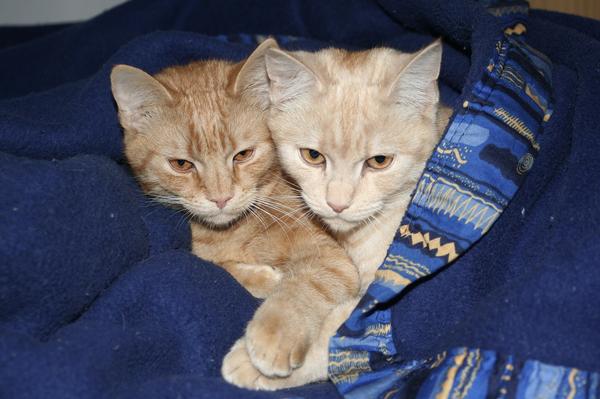Do Cats Understand WORDS? Well, It's Kinda Complicated…

Ever wonder if your feline friend truly understands the words you're saying?
Can they decipher your sweet nothings from your angry rants?
Well, hold onto your whiskers, my curious cat lovers, because we're about to dive into the fascinating world of feline linguistics.
I feel ya, trust me 😺.
You've spent countless evenings questioning whether Mittens is secretly fluent in English.
But fear not, my friends, because today we're unraveling the mysteries and answering the burning question:
Do cats understand words?
So without further ado, let's embark on this enchanting journey together.
Buckle up, folks – it's about to get pawsome!
Exploring the Cognitive Abilities of Cats in Language Comprehension
When it comes to language comprehension, cats are more capable than you might think.
Here's the lowdown:
- Cats can recognize and respond to their own names. So yes, your kitty knows when you're calling them!
- This ability indicates a level of language comprehension that researchers have been exploring.
- Cats are intelligent creatures and possess learning abilities similar to those of dogs.
- However, unlike their canine counterparts, cats aren't as inclined to obey human commands.
- They tend to be independent thinkers and may not always feel like showcasing their acquired knowledge to their owners.
But wait, there's more!
Research has shown that cats can understand and respond to certain words and phrases they've been trained to associate with treats or playtime.
In fact, cats can even learn to differentiate between different words and understand simple instructions.
So don't underestimate your feline friend.
While they may not be as eager to please as dogs, cats definitely have cognitive abilities when it comes to language comprehension.
Next time you're chatting with your cat, remember that they may understand more than you give them credit for.
Go ahead and test their skills with some basic commands or try teaching them new words.
You might just be pleasantly surprised by what your furry companion is capable of! 😺
Main points I'll expand upon further down this article:
- Cats recognize the sound of their owner's voice and respond to their name.
- Cats associate their names with actions like being fed or petted.
- Pay attention to your cat's body language when calling their name.
- To teach your cat to respond to their name, call them in a clear, calm voice and reward them with a treat.
- Cats understand when their name is being called, even if it's a stranger's voice on a recording.
- Cats can respond to your voice, gestures, and expressions, but they don't grasp the precise meaning of your words.
- Cats recognize certain words through association with tone and body language.
- Cats can associate words or sounds with objects, actions, and people.
- Regularly talking to your cat strengthens your bond and has a positive impact on both of your mental health.
- Communicate with your cat in a gentle and positive tone, using consistent tone and word associations.
But what exactly goes on in a cat's mind when they hear their name?
How do they recognize and respond to it?
Let's delve deeper into the fascinating science behind cats' ability to comprehend language and unravel the secrets behind their unique cognitive abilities.
Trust me, you won't want to miss out on this intriguing insight into your furry friend's mind!
Do Cats Know Their Names?
Do cats know their names?
Yes, they do! 🐱
When you call your cat by their name, you might notice little things like their ears moving or their head tilting.
It's a surefire way of knowing that they recognize the sound of their own name.
Now, let me make this clear - cats don't understand human language like we do.

But they do connect their names to positive stuff, like yummy food or fun playtime.
Here are some cool facts about cats and their names:
- Even if you call out one cat's name, other cats may respond. It's pretty amazing how they figure out who you're talking about.
- Watch your cat's body language when you say their name. They might turn their head or twitch their ears, which means they acknowledge you even if they don't come running right away.
- If you want your furry friend to respond to their name, say it in a calm and clear voice. And when they actually react, give them a treat as a reward. Positive reinforcement is key here!
- Believe it or not, cats can even recognize their name when someone they don't know says it on a recording. They get super alert and show that they understand they're being talked to.
- Oh, and just so you know, not all cats will consistently answer to their owners' calls. But hey, that just adds to their adorable charm!
So, there you have it - cats really do know their names.
Pretty cool, huh?
But did you know that cats have a remarkable ability to detect things beyond just their names? If you're curious about how cats can sense even something as complex as human pregnancy, I encourage you to check out my blog post, Can Cats Sense Pregnancy.
It's a fascinating topic that delves into their incredible instincts and the way they can pick up on subtle changes.
Take a dive into this intriguing subject and unlock the secrets of our feline friends!
Can Cats Understand Human Language?
- Cats don't get the words you say, but they understand how you say them. Use a calm voice to chat with your furry buddy.
- Your body language matters too. Cats watch your moves and face for signals. Stay relaxed and welcoming if you want to connect with your cat.
- Words can have power if linked to something good. Practice saying a specific word before giving your cat something they love, like a tasty treat. They'll start making positive connections.
- Remember, cats don't grasp all our words. They know you're talking to them, but expect them to struggle with complex sentences or commands.
- Chatting with your cat happens through touch and encouraging behavior. Caress gently, speak softly, and reward them to strengthen your bond.
Cats might not get the exact words, but they sure pick up on our vibes and feelings.
Explore further: Have you ever wondered if cats can sense bad weather or predict weather changes? If so, you'll be interested in Can Cats Sense Bad Weather. Discover fascinating insights into how our feline friends may have a sixth sense when it comes to the weather.
But, you might be wondering, do cats really understand any of the words we say?

Are they simply picking up on our tone and body language, or is there more to their language comprehension than meets the eye?
Well, I'll let you in on a little secret:
While cats may not grasp all our words like we do, they actually have an approximate capacity to understand around 2040 human words!
Yes, you heard that right.
So, let's dive deeper into the fascinating science behind our feline friends' word recognition abilities and find out just how much they truly comprehend:
Understanding Cats: Quantifying Their Comprehension
Cats have limited understanding of human words
So, here's the scoop about cats and language...
You know what?
Cats can grasp only around 2040 human words. Yeah, it sounds impressive, doesn't it?
But hey, don't go assuming they comprehend language like we do.
Not at all, my friend.
They aren't sitting there pouring over Shakespeare during their downtime.
The thing is, cats don't truly understand the meaning of words. Instead, they associate words with your tone of voice and how you act.
Basically, it's more like this: "Oh, when you say that word in a happy way and give me treats, it must be something good!"
Cats link words to actions and rewards
Here's how it works...
When you consistently use specific words or phrases while doing certain things, your cat starts making connections. For instance, if you always say "dinner time" right before feeding them, they start associating those words with food.
Believe me, my friend, cats are all about the food!
But wait, there's more!
They also recognize the sound of their own name.
Yes, they know when you're calling them. It's like they suddenly perk up and pay attention, hoping for some snuggles or maybe even a treat.
Cats can connect vocalizations with specific things
Scientists, always delving into fascinating research, have discovered that cats can connect sounds of 25 to 40 words with particular objects or actions.
In simpler terms, they begin to understand what you're talking about when you use certain words. Pretty smart, right?
And hey, cats aren't just bundles of fluff and cuteness.
They can also learn repetitive or uncommon alerting sounds.
So, don't underestimate their ability to pick up on specific noises and respond to them.
By the way, did I mention cats can be absolutely adorable little egotists?
It's the honest truth, my friend.
Let me break it down for you: There's even more to learn about communicating with your cat further down the blog post. I'll provide tips and tricks so you can better connect with your feline friend. Keep reading for all the details!
Cats' Preferences Regarding Human Communication
Cats enjoy hearing the sound of your voice.
And let's be honest, they associate it with care and feeding.
That’s a pretty good reason why they might like being talked to.
You see, when you talk to your cat frequently, it helps to strengthen the bond between the two of you.
It's beneficial for both humans and felines alike.
Talking to your cat has a positive impact on stress and mental health.
In fact, cats respond well to a soft and calm voice.
And they can easily interpret your mood through your speech.
However, you should note that they may choose to ignore you if there is no benefit or harm involved.
They demonstrate habituation by learning to ignore signals that don't affect them.
But all in all, talking to your cat is a great way to connect with them and show your love and care.
Communication Methods for Interacting with My Cat

To effectively communicate with your cat, try these 10 tried-and-true methods:
- Use gentle and positive tones when speaking to your cat.
- Maintain consistency in tone and word associations.
- Avoid using harsh tones or raising your voice.
- Steer clear of stern words that may frighten or stress your cat.
- Focus on nonverbal communication, as cats respond well to it.
- Use positive vocalization, such as purring or softly talking to your cat.
- Incorporate gestures like smiling and nodding to show affection.
- Use an upbeat and friendly tone of voice during interactions.
- Pay attention to your cat's body language and react accordingly.
- Be patient and understanding, as each cat is unique and may have different communication preferences.
Effective communication with your cat can strengthen your bond and create a harmonious home environment.
And that wraps up today's article.
If you wish to read more of my useful articles, I recommend you check out some of these: Can Cats Sleepwalk, Can Cats See in the Dark, Do Cats Have Nightmares, and What Does the Position of Your Cats Whiskers Mean
Talk soon,
-Sarah Davis